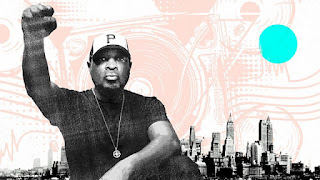Review - Fight The Power: How Hip Hop Changed The World
Our own OG, Marc Nash, watched the 4-part BBC documentary series Fight The Power: How Hip Hop Changed The World...
I was really looking forward to this documentary series. From its transition to the UK in the mid-80s as an antidote to New Romanticism and Synth-Pop, hip hop so grabbed my attention, that I stopped listening to my beloved dub reggae until I finally returned to it in my 50s. But this documentary series proved something of a mixed bag.
Chuck D of Public Enemy is our guide and indeed the talking heads throughout are impressive, both musicians and social and political commentators. Episode one, tracking its roots to the New York of the 1970s and more specifically The Bronx, was clear, chronological and clinical. From slumlord arson, seeing as insurance paid out more than rent, through to block parties because the discos were too expensive to attend, though it was disco’s beats that formed the first hip hop backing tracks, a picture emerges of a hellscape reclaimed and repurposed by its marooned community. We get the four elements that made up that community and formed their creative response to their environment; DJs spinning and scratching the grooves, MCs rapping over them, graffiti artists and body poppers, all clearly coming together as a community with something of a united vision.
The problem thereafter is we never have such a clear throughline of the narrative. Episode two, mainly about the crack epidemic and the rise of West Coast Rap, is all over the place. As fragmented as a world experienced through crack possibly. Veering back and forth to repeat itself and deliver little of insight. West Coast Rap shared similar lyrical themes, of police brutality, racism and street drug dealing, only its beats were mellower. There was far more screen time devoted to the police spread-eagling and handcuffing Afro-Americans than there was given to the music.
Episodes three and four provide a whistle-stop tour through the political moments where hip hop rubbed up against power, from Rodney King and the LA riots, through PMRC censorship, 9/11 and Middle Eastern wars, Clinton’s electoral betrayal, hip hop’s mobilisation of the vote behind Obama, Eminem taking on Trump and finally BLM. The problem being that not enough time was given to any of these. Women artists’ response to the misogyny was well covered, but the rise of the hip hop star as business mogul and global brand expanding into fashion, perfumes, headphones, etc, on a scale to rival Trump’s, was barely analysed. And this diffusion into the culture through all these hubs, seems a far more lasting influence of hip hop than its interactions with politics.
A missed opportunity after such a promising start. It could easily have justified a fifth or even a sixth episode, but either the producers took an executive decision, or the television networks did, again implying that hip hop doesn’t quite wield the clout the programme liked to suggest it did. And as usual with documentaries on music, the actual soundtrack delivered a very limited spread of tunes, presumably because the cost of licensing the broadcasting rights would have made the whole endeavour uneconomical. Now, we really need such a series on dub reggae; no one’s going to try and collect on the licensing of Studio One and Trojan seven inch singles.






Post a Comment